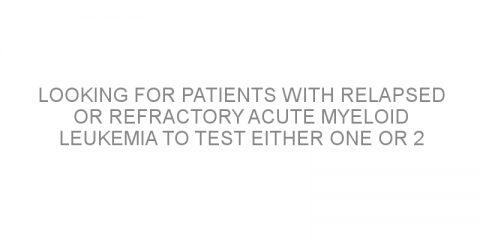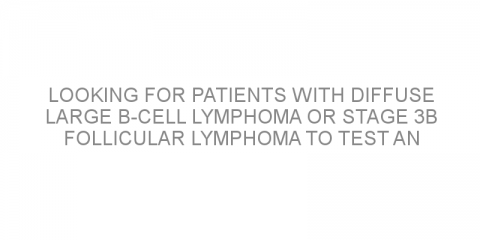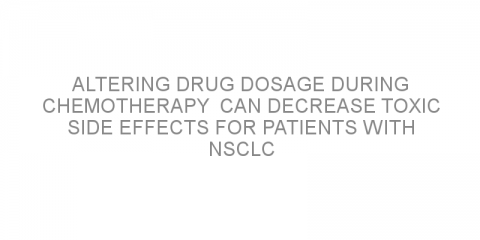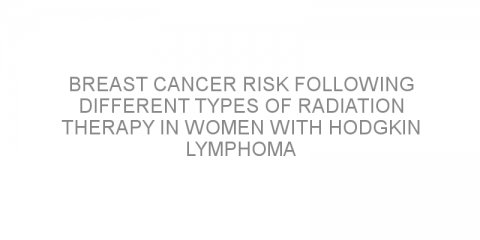In a nutshell This phase 3 clinical trial will evaluate the safety and effectiveness of a copanlisib (BAY 80-6946) and rituximab (Rituxan) combination in treating patients with relapsed indolent B-cell non-Hodgkin’s lymphoma (iNHL). The primary outcome will be measured by time to disease progression. The details Copanlisib is an inhibitor of...
Read MorePerformance status-2 – Symptomatic, 50 in bed Posts on Medivizor
Looking for patients with relapsed or refractory cutaneous lymphoma to test a novel immunotherapy
In a nutshell This phase 1/2 clinical trial will test the response to AFM13 in patients with relapsed or refractory cutaneous (on the skin) CD30 positive lymphomas. The primary outcome will be measured by immune system activity. This study will be conducted at the Center for Lymphoid Malignancies in New York, New York. The details AFM13 is an...
Read MoreLooking for patients with relapsed or refractory acute myeloid leukemia to test either one or 2 immunotherapies with a chemotherapy
In a nutshell This phase 2 clinical trial will test the safety and tolerability of a nivolumab (Opdivo) and 5-azacytidine (Vidaza) combination with or without ipilimumab (Yervoy) in treating relapsed or refractory (unresponsive to treatment) acute myeloid leukemia (AML). The primary outcome will be measured by the maximum tolerated dose. This trial is...
Read MoreLooking for patients with chronic myelogenous leukemia or Philadelphia chromosome positive acute lympholastic leukemia to test a BCR-ABL1 inhibitor
In a nutshell This phase 1 clinical trial will test the safety of ABL001 alone and with either nilotinib (Tasigna), imatinib (Gleevec), or dasatinib (Sprycel) in patients with chronic myelogenous leukemia (CML) or Philadelphia chromosome-positive acute lymphoblastic Leukemia (Ph+ALL). The primary outcome will be measured by side effects. The details...
Read MoreLooking for patients with relapsed or refractory chronic lymphocytic leukemia, acute lymphoblastic leukemia, and non-Hodgkin’s lymphoma to test a CAR T-cell treatment
In a nutshell This phase 1/2 clinical trial will test the effectiveness of chimeric antigen receptor (CAR) T-cells in treating chronic lymphocytic leukemia (CLL), acute lymphoblastic leukemia (ALL), and non-Hodgkin’s lymphoma (NHL). The primary outcome will be measured by the response to treatment, overall survival, and the maximum tolerated...
Read MoreLooking for patients with diffuse large B-cell lymphoma or stage 3b follicular lymphoma to test an antibody-drug conjugate with chemotherapy
In a nutshell This phase 2 clinical trial will determine the effectiveness of denintuzumab mafodotin (SGN-CD19A) with RICE chemotherapy in patients with relapsed or refractory (unresponsive to treatment) diffuse large B-cell lymphoma (DLBCL) or stage 3b follicular lymphoma (FL). The primary outcome will be measured by the complete remission...
Read MoreAltering drug dosage during chemotherapy can decrease toxic side effects for patients with NSCLC
In a nutshell This trial examined whether altering the recommended dose of chemotherapy drugs during treatment was beneficial to patients. This trial concluded that altering doses of paclitaxel (Taxol) during chemotherapy could be beneficial to reduce neuropathy in patients with advanced non-small-cell lung cancer. Some...
Read MorePhysical exercise after surgery is associated with improved recovery from colorectal cancer
In a nutshell This study investigated the effects of exercise on recovery from colorectal cancer surgery. Researchers reported that exercise was associated with an improved recovery. Some background Recovery after surgery is only complete when the patient is able to return to normal day-to-day life. Not all colorectal cancer patients recover their...
Read MoreComparing axillary lymph node ultrasound and fine needle aspiration in breast cancer
In a nutshell This study investigated whether patients with a suspicious axillary lymph node (ALN) but negative fine-needle aspiration result (FNA) can be considered as having node-negative disease (AUN). The study concluded that patients with suspicious ALN on ultrasound but negative FNA results can be treated as having node-negative disease. Some...
Read MoreUsing aggressive treatment after first line treatment for advanced non-small-cell lung cancer
In a nutshell The authors examined the use of local consolidative therapy to treat patients with advanced NSCLC with few metastases after first line treatment. They concluded that this is more effective than maintenance therapy alone for this specific group of patients. Some background Previous studies that examined treatment failure after first...
Read MoreThe use of MR imaging to predict invasive breast cancer prognosis
In a nutshell This study investigated the use of magnetic resonance (MR) imaging as a prognostic tool in primary breast cancer (BC) patients. The study concluded that MR imaging can identify features which can be used to help predict the risk of distant metastasis (cancer spread to other areas) in patients. Some background Between 20-30%...
Read MoreBreast cancer risk following different types of radiation therapy in women with Hodgkin lymphoma
In a nutshell This study determined whether targeted radiotherapy reduced the risk of secondary breast cancer in women with Hodgkin lymphoma compared to radiotherapy delivered to a larger area. The authors concluded that while larger field radiation was associated with an increased risk of breast cancer, targeted approaches did not...
Read More














